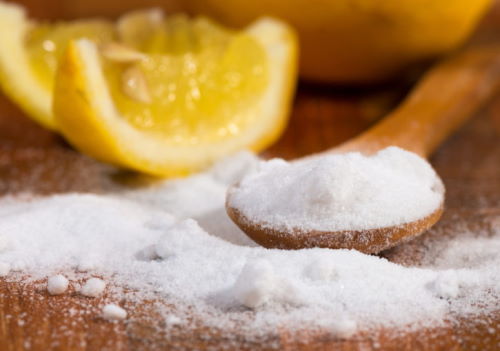I bet if you look in your kitchen cabinets, you probably have a box of baking soda, otherwise known as sodium bicarbonate, or sodium hydrogen carbonate.
Baking soda is a longstanding formula of natural sodium ions and bicarbonate ions, that has many health and household uses, beyond an ingredient for baking or for deodorizing the fridge.
Baking soda is especially good for your health, primarily because of its ability to alkalize the body and counteract acids.
BREAKING: Diabetes Breakthrough Leaves Doctors Speechless - Try This Tonight
Baking soda is not the same thing as baking powder. While both are used to help make cakes and baked items rise, baking powder contains other ingredients such as cornstarch.
Baking soda is an inexpensive, natural health and household helper. Baking soda typically costs about a dollar a box and is safe and easy to use. Let’s take a look at some of the amazing things that baking soda can do to improve your health.
1. Baking Soda Helps Autoimmune Disease
A daily dose of baking soda may help reduce the destructive inflammation of autoimmune diseases like rheumatoid arthritis, scientists say.
The right pH balance in the body is necessary for overall health. When one is too acidic (generally the result of a poor diet, high in sugar), a variety of health issues can show up. And it is true, many alternative health practitioners say it’s much better to be slightly alkaline than too acidic.
In April 2018, the Journal of Immunology medical journal published a study that showed drinking water mixed with baking soda could reduce chances of getting inflammatory conditions.
After the test subjects spent two weeks drinking the baking soda and water mixture, scientists found that their immune cells appeared to change what they were doing. Researchers said that the immune cells began to focus on reducing inflammation instead of promoting it.
It appears that the baking soda acted as a way to “turn on” the immune cells’ anti-inflammatory response. Chronic conditions such as rheumatoid arthritis and other autoimmune diseases could benefit from these anti-inflammatory properties.
The scientists in the study combined 1/4 teaspoon of baking soda with 20 ounces of water, and the mixture was sipped throughout the day. Experts suggest starting by mixing 1/8 teaspoon of baking soda with a glass of water and drinking it a few times a week.
2. Prevents Kidney Disease
Baking soda can help promote healthier kidneys and lessen the chances of kidney disease. A clinical study published in the Journal of the American Society of Nephrology looked at the effects of sodium bicarbonate on patients with chronic kidney disease (CKD) and low blood bicarbonate levels.
It was found that the subjects who supplemented with bicarbonate tolerated it well and were significantly less likely to experience rapid progression of their kidney disease. Additionally, there were less patients that developed end-stage renal disease in the bicarbonate group compared to the control group. Overall, the researchers concluded that the study showed bicarbonate supplementation slows the rate of progression of renal failure.
Kidney stones are considered to be extremely painful, and once you get them, you may be more prone to have recurring kidney stones. So not only is there motivation to prevent future kidney stones, but more importantly, untreated kidney stones can sometimes worsen into kidney disease.
Kidney stones are made of a variety of substances and if kidney stones tend to be uric acid, it is because their urine is too acidic. Adjusting the pH of the urine, reduces the risk of uric acid stone formation and can also help dissolve existing stones. Sodium bicarbonate can be used to alkalinize the urine.
3. Baking Soda and Cancer
Cancer tends to flourish in an acid environment. Baking soda is known to alkalize the pH of acidic tumors without affecting the pH balance of healthy tissues and the blood.
There is some research that shows oral doses of sodium bicarbonate may lower the acidity of the tumor pH and inhibit metastases (spreading to other areas of the body) in animals with metastatic breast cancer.
Cancer cells are generally fast-growing, and chemotherapy drugs tend to target the fast-growing cells. However, many cells in solid tumors have their oxygen supply shut off, causing the pH levels of the cells become acidic.
Since baking soda neutralizes acid, some researchers believe drinking it could reduce the tumor’s acidity and cause the cells to become easier targets for cancer treatments.
So far, most of the evidence for sodium bicarbonate’s effect on cancer cells comes from animal studies and laboratory experiments—not human studies. Due to the lack of clinical studies on humans, use of sodium bicarbonate as a complementary cancer therapy should be approached with caution and always notify your doctor.
4. Stops Urinary Tract Infections
Urinary tract infections are one of the most common infections people get, according to the CDC. Women usually get them more often than men, due to the fact that their urethras are shorter, and bacteria can easily travel up the urethra.
Women who tend to get UTI’s frequently also had more acidic urine. In a study, women who took baking soda daily for four weeks had significantly less UTI’s. Overall, baking soda appears to be an easy and inexpensive way to prevent UTI’s without the side effects of antibiotic use.
5. Improves Athletic Performance, Lessens Fatigue
Competitive athletes are always looking for a way to boost their performance, and if you look at the supplement market for athletes, there is a huge variety of supplements to choose from.
Baking soda can be one of the least expensive—and legal—ways to boost performance, increase endurance, lower lactic acid, and lessen muscle soreness. Some studies show that baking soda can help you perform at your peak for longer, especially during high intensity training and sprinting.
During high intensity exercise, muscle cells produce lactic acid. Lactic acid is generally responsible for that ‘burn’ and fatigue in muscles. Since lactic acid is an acid, it lowers the pH inside your cells, causing those tired burning muscles.
Baking soda helps to counteract this fatigue as it neutralizes the lactic acid. This is thought to delay fatigue, allowing you to exercise at your peak longer.
This study found that people who took baking soda exercised for an average of 4.5 minutes longer than people who didn’t take baking soda. While this doesn’t seem like a lot, it can mean the difference between winning a sprint in a race, and not winning. The baking soda not only improves exercise output but can also help reduce damage to the muscle and helping with post-workout soreness.
While some studies recommend taking 300mg of baking soda per 1 liter of water, an hour or two before exercising, other studies suggest taking it 3 or more hours prior to exercise with food.
Note: Bicarbonate loading for athletic purposes can cause nausea, excessive gas, cramps and diarrhea that can definitely impair athletic performance. Best to start with low dose amounts of baking soda on a full stomach.
6. Relief from Heartburn and Indigestion
Heartburn results from an overabundance of hydrochloric acid and other acids in the stomach. It often happens from eating too much greasy, rich food or spicy foods. Sometimes food sensitivities can also spark heartburn.
Baking soda is one of the most effective remedies for heartburn. So much so, that many over the counter heartburn preparations contain baking soda, like Alka-Seltzer. For occasional heartburn, simply add half a teaspoon baking soda to two cups of water about an hour after eating.
Baking soda is not recommended for frequent heartburn, as it neutralizes the effects of stomach acid which are there to break down food. If you have heartburn on an ongoing basis, checking for food sensitivities may be a good idea.
7. Brightens and Whitens Teeth, Removes Plaque
One of the best ways to remove plaque and stains from your teeth without having to visit the dentist, is to brush with baking soda. Baking soda works as a gentle abrasive to remove stains. Baking soda also helps to neutralize acids produced by bacteria in the mouth and to freshen breath.
Using baking soda can be antibacterial and can actually help eliminate germs associated with plaque. By reducing the number of germs on the teeth, the glossy surface of the tooth enamel is better protected. To brush with baking soda, wet your toothbrush, then dip into a teaspoon or so of baking soda, or mix with your favorite toothpaste.
8. Fight Colds, Flu and Sore Throats
Because baking soda helps to alkalize the blood in the body, it is thought to be an effective cold/flu preventative. Even back in 1920’s, while the Spanish flu was raging, Arm & Hammer quotes Dr. Volney S. Cheney in their booklet, “Arm & Hammer Baking Soda Medical Uses.”
“In 1918 and 1919 while fighting the ‘flu’ with the U. S. Public Health Service it was brought to my attention that rarely anyone who had been thoroughly alkalinized with bicarbonate of soda contracted the disease, and those who did contract it, if alkalinized early, would invariably have mild attacks.
I have since that time treated all cases of colds and influenza…by first giving generous doses of bicarbonate of soda, and in many, many instances within 36 hours the symptoms would have entirely abated…”
While the treatment for colds and flu has no formal scientific studies, it is harmless and can even be good for you and is worth giving it a try. Numerous anecdotal accounts of baking soda preventing colds or flu have been passed on through the years.
Recommended dosages from the Arm & Hammer Company for colds and influenza back in 1925 were:
- Day 1 — Take six doses of ½ teaspoon of baking soda in glass of cool water, at about two-hour intervals
- Day 2 — Take four doses of ½ teaspoon of baking soda in glass of cool water, at the same intervals
- Day 3 — Take two doses of ½ teaspoon of baking soda in glass of cool water morning and evening, and thereafter ½ teaspoon in glass of cool water each morning until cold symptoms are gone.
9. Helps Sore Throats
Sore throats often accompany colds and flu, and while the saltwater gargle has been a popular natural soothing agent, baking soda and water—or baking soda, salt and water, can help relieve a sore throat too.
Gargling with this solution can also kill bacteria that may reside in the throat, and also prevent the growth of yeast and fungi.
Because baking soda is a natural anti-inflammatory, baking soda appears to direct immune cells to reduce inflammation, instead of prompting it. In other words, baking soda helps boost the body’s anti-inflammatory response, putting out a calming signal instead of an emergency attack signal, which is most likely why baking soda is effective at helping colds, flu and sore throats.
According to the National Cancer Institute, gargling and gently swishing a combination of 1 cup warm water, 1/4 teaspoon baking soda, and 1/8 teaspoon of salt every three hours will help.
10. Soothes Canker Sores
Canker sores occur on the inside of the mouth and it’s thought they generally come from a diet too high in acid-forming foods, such as processed foods, acidic food or drinks, and sugar. The higher acid content in the body, combined with inflammation is thought to cause the canker sore.
When the alkalizing baking soda comes into contact with acid, it neutralizes it. Baking soda on canker sores helps to balance the pH of the sore and speeds up the healing of the whole mouth. It also helps to kill bacteria and freshen the breath.
11. Soothes Skin Rashes, Bug Bites and Sunburn
Skin rashes, eczema, mosquito bites, bee stings, poison ivy, sunburn and even splinters, can all be soothed and helped with baking soda.
Itchiness, redness and irritation are all a result of inflammation in the skin. The anti-inflammatory virtues of baking soda ease the itchiness and burn from all these skin conditions.
Simple make a paste and apply it to the affected area—or add 1 cup of baking soda to a warm bath and soak in it for 15 minutes.
For splinters, make a paste of baking soda, apply a small bandage to cover the area and within a day or so, the splinter usually comes out of the skin on its own.
When to Avoid Baking Soda
TRENDING: 72-Year Old Grandma's Anti-Aging Discovery Sweeps The Nation
Like everything else in life, ingesting too much baking soda can be too much of a good thing. A tablespoon of baking soda dissolved in a glass of water and taken occasionally is okay, but taking too much could have adverse effects.
For many people, ingesting baking soda can cause vomiting, gas, cramping and diarrhea. It’s always good to consult with your health care professional when starting to use baking soda on any regular basis.
Baking soda can interact with certain medications.
High sodium concentrations in baking soda can cause high blood pressure, seizures, dehydration, and kidney issues. Always be sure to consult with your doctor before supplementing with baking soda, especially if you are being treated for a specific health issue.
If you found this article interesting, take a look at this helpful book my friends from Alternative Daily put out with even more beneficial health information about baking soda:
But, like I said, you have to hurry because she only has a handful of these left and if you don’t confirm your address your book will be sent to another lucky individual who will immediately start improving their physical, mental and home health with Baking Soda!









